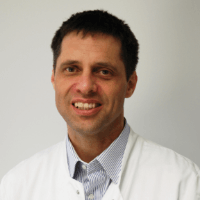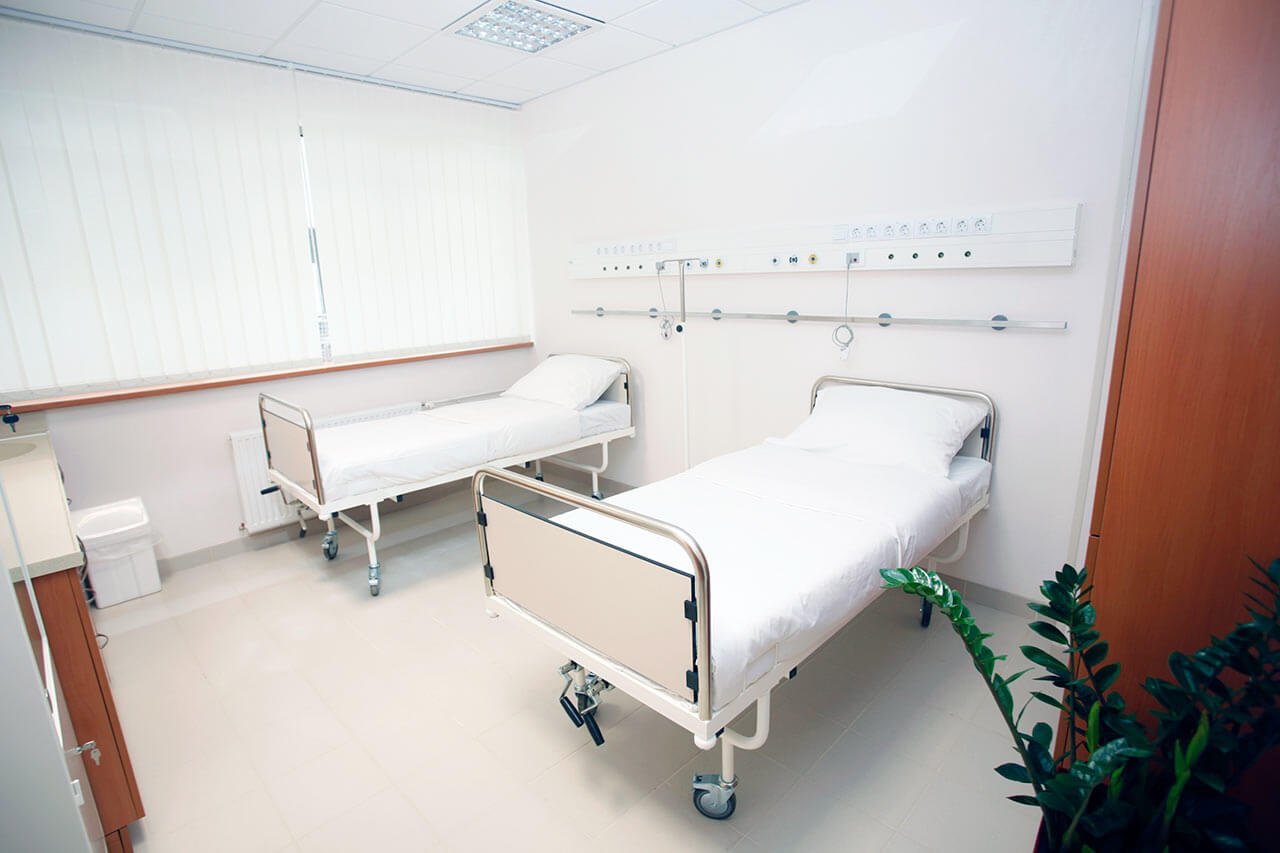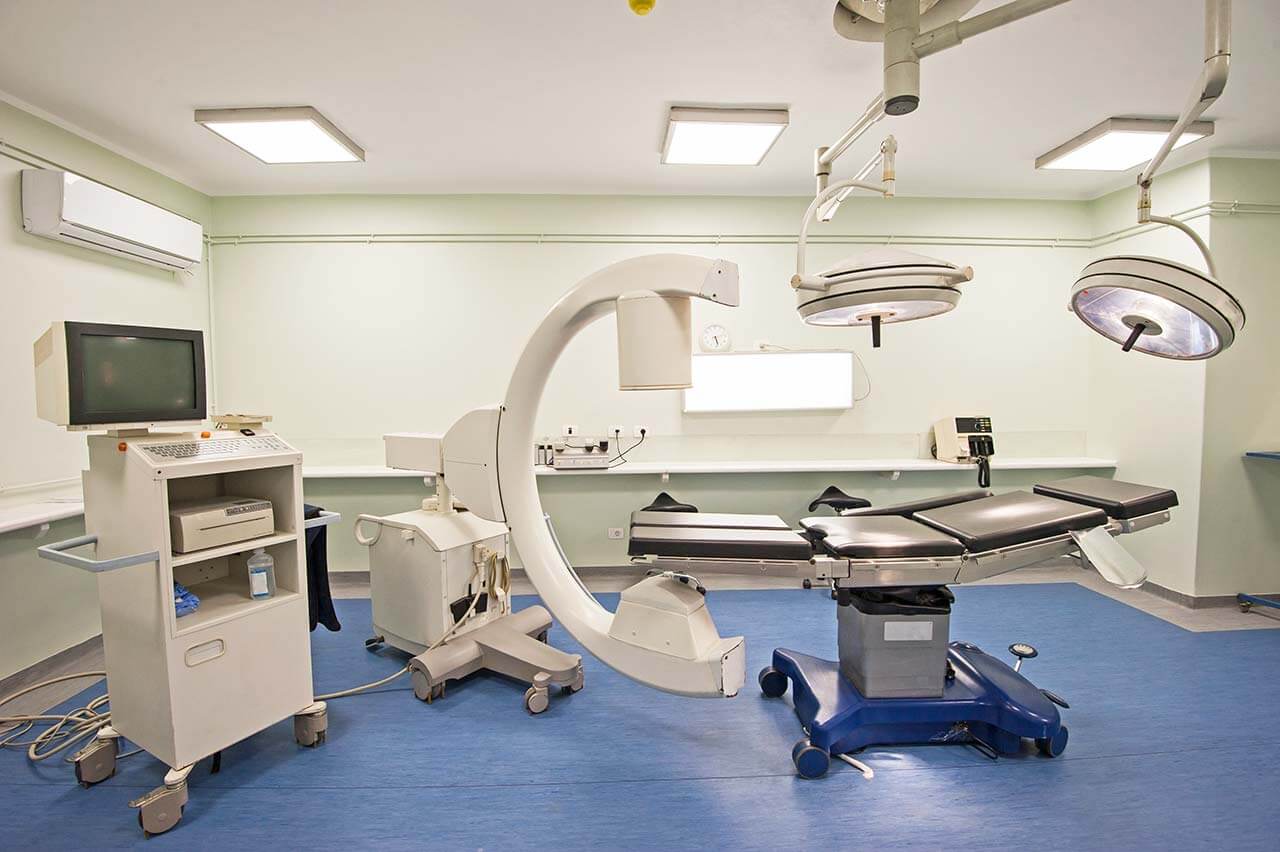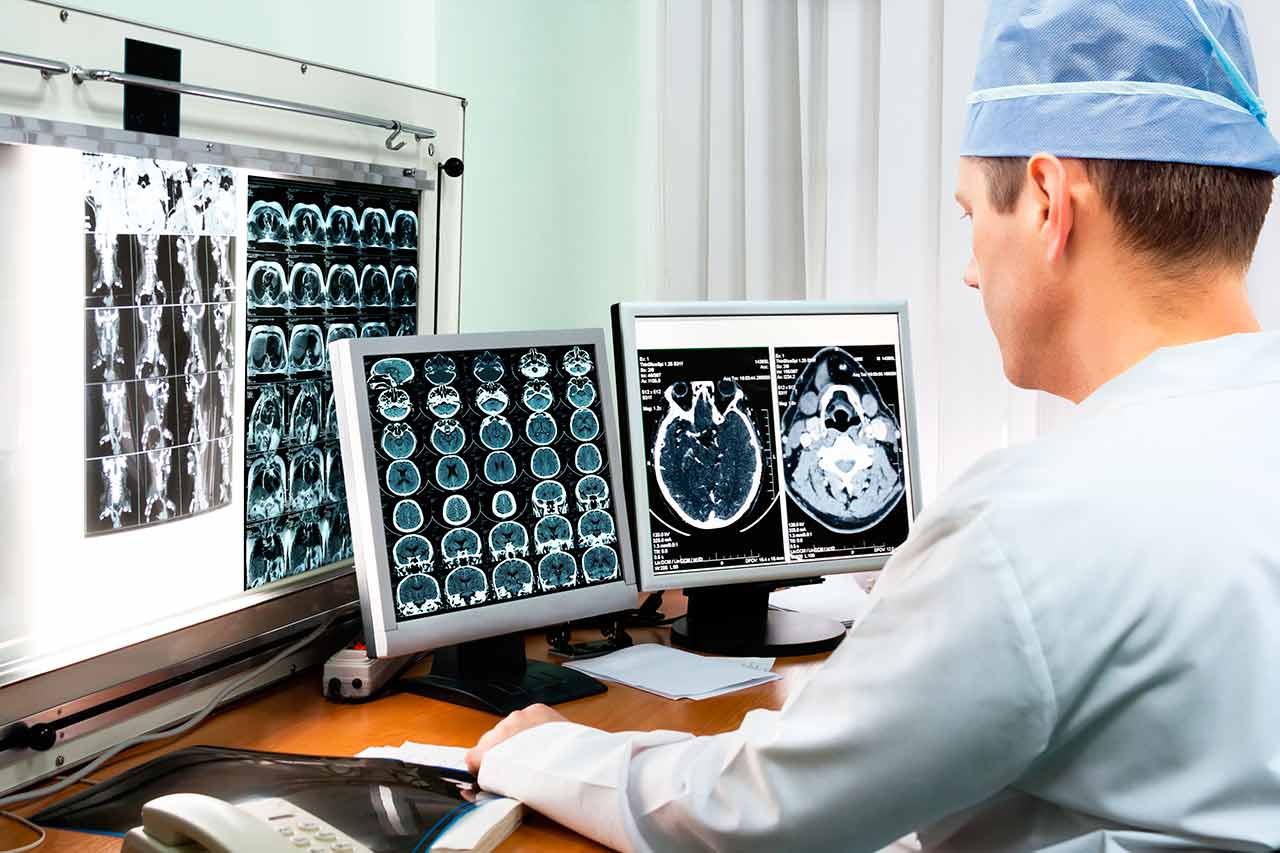
The program includes:
- Initial presentation in the clinic
- clinical history taking
- review of medical records
- physical examination
- laboratory tests:
- complete blood count
- biochemical blood test
- tumor markers (AFP, CEA, СА-19-9, CA 72-4)
- inflammation markers (CRP, ESR)
- blood coagulation analysis (aPTT, PT, INR)
- ultrasound of the abdomen
- gastroscopy (with H.pylori test)
- biopsy with histological and immunohistochemical study (if clinically indicated, additional cost is 2500€)
- CT/MRI of the abdomen (if clinically indicated, additional cost is 650/1200€)
- nursing services
- consultation of related specialists (tumor board)
- treatment by chief physician and all leading experts
- explanation of individual treatment plan
Required documents
- Medical records
- Esophagogastroduodenoscopy (EGD), MRI/CT scan (not older than 3 months)
- Biopsy results (if available)
Service
You may also book:
 BookingHealth Price from:
BookingHealth Price from:
About the department
The Department of Gastroenterology, Hepatology, Endocrinology, Diabetology and Infectology at the University Hospital Muenster offers the full range of diagnostic and therapeutic services in these fields. The department is headed by Prof. Dr. med. Hartmut Schmidt. Thanks to rich clinical experience, acquired in the best medical facilities in Germany and abroad, the physician has gained an excellent international reputation.
The physicians of the department specialize in the treatment of hepatic, gastrointestinal, infectious diseases, pathologies of the endocrine glands and all types of diabetes mellitus. To make an accurate diagnosis, there are used the most advanced laboratory tests, ultrasound diagnostics and numerous endoscopic methods. In addition, the department’s scope of activities includes care for patients before and after liver, pancreas and small bowel transplantation. The combination of an outstanding competence of physicians, progressive treatment methods and the most advanced medical equipment ensures the excellent quality of medical care.
It is worth noting that the department’s specialists are also actively engaged in research activities, which allows them to develop innovative treatment methods, and thus save people’s lives. The patients of the department have access to the treatment conducted within the clinical trials of both national and international levels.
The department’s service range includes:
- Diagnostics and treatment of liver diseases
- Liver cirrhosis
- Wilson's disease
- Hemochromatosis
- Transthyretin amyloidosis
- Hereditary amyloidosis
- Viral hepatitis
- Acute kidney failure (multimodal treatment concept)
- Hepatocellular carcinoma
- Cholangiocellular carcinoma
- Liver adenoma
- Diagnostics and treatment of gastrointestinal diseases
- Crohn's disease and ulcerative colitis
- Pancreatitis
- Gastrointestinal cancers
- Biliary tract diseases
- Care for patients before and after liver, pancreas and small intestine transplantation
- Ultrasound diagnostics and ultrasound-guided therapeutic procedures
- Endoscopic procedures
- Gastroscopy and colonoscopy, including polyp removal and endoscopic therapy for esophageal and gastric varicose veins (for example, in patients with cirrhosis)
- Interventions on the biliary tract (endoscopic retrograde cholangiopancreatography, percutaneous transhepatic drainage of the gallbladder), treatment of benign and malignant stenosis of the bile ducts
- Endoscopic ultrasound (endosonography) with punctures and therapeutic interventions (for example, endoscopic radiofrequency ablation of malignant focal lesions)
- Percutaneous radiofrequency ablation
- Endoscopy of the small intestine, including endoscopic interventions in patients after small bowel transplantation
- Minilaparoscopy
- Liver biopsy
- Diagnostics and treatment of hormonal and metabolic disorders (endocrinology)
- Thyroid diseases
- Parathyroid diseases
- Adrenal gland diseases
- Pituitary diseases
- Disorders of male and female sex hormones
- Hormone replacement therapy in patients with gender identity disorders
- Bone metabolism disorders (for example, osteoporosis, Paget's disease and phosphate diabetes)
- Neuroendocrine tumors (interdisciplinary collaboration)
- Lipodystrophy (special clinical focus)
- Diagnostics and treatment of patients with type 1 diabetes mellitus, type 2 diabetes mellitus, gestational diabetes and other types of diabetes
- Insulin pump therapy
- Modern glucose monitoring systems (CGM/FGM)
- Patient training (nutrition, drug therapy, monitoring of blood glucose levels)
- Diet therapy
- Diagnostics and treatment of infectious diseases
- Chickenpox
- Tuberculosis
- Multidrug-resistant infections that require special antibiotic therapy
- HIV infection and AIDS
- Sexually transmitted diseases (for example, syphilis, gonorrhea and herpes)
- Opportunistic infections (for example, toxoplasmosis, reactivation of cytomegalovirus infections)
- Gastrointestinal infections, including viral hepatitis (for example, hepatitis A, B, C) and diarrheal pathogens (norovirus and salmonella clostridium)
- Other diseases, diagnostic and therapeutic options
Curriculum vitae
Education
- 1982 - 1988 Study of Human Medicine at the Hannover Medical School.
- 08.1985 - 10.1985 Internship at the South West Cardiothoracic Centre, Plymouth Hospitals NHS Trust, Derriford Hospital, UK (educational grant of the German Academic Exchange Service (DAAD)).
- 1985 - 1988 Doctoral student of the Working Group on Clinical Nutrition and Fat Metabolism (Prof. Dr. C. Canzler), Department of Gastroenterology and Hepatology (Prof. Dr. F.W. Schmidt) of the Hannover Medical School.
- 1986 - 1987 Clinical advanced training in Metabolic Disorders, Genetics and Endocrinology (Head: Prof. Dr. B. Weintraub, Prof. Dr. J.J. Mulvihill) and research stay at the Section for Molecular Diseases (Head: Prof. Dr. H.B. Brewer), National Institutes of Health, Bethesda, USA (educational grant of the German Academic Exchange Service (DAAD)).
- 1987 - 1988 Practical year in Internal Medicine at the National Institutes of Health, Bethesda, USA; in Surgery at the Vinzenz Hospital Hannover; in Radiology at the Hannover Medical School.
- 1988 3rd state examination at the Hannover Medical School (grade: "very good").
Clinical and Scientific Career
- 1988 - 1990 Internship in the Department of Gastroenterology and Hepatology (Head: Prof. Dr. F.W. Schmidt), specialization in Gastroenterology, Nephrology, Rheumatology.
- 1990 Research Fellow of the Department of Gastroenterology and Hepatology at the Hannover Medical School (under the direction of Prof. Dr. med. F.W. Schmidt, from 1992: Prof. Dr. M.P. Manns).
- 1992 - 1994 Clinical training in lipid metabolism disorders and research stay at the Section for Molecular Diseases (Head: Dr. H.B. Brewer, Jr.), National Institutes of Health, Bethesda, USA (International Scholarship of the German Research Foundation (DFG)).
- 1994 - 1999 Resumption of employment as a research Fellow of the Department of Gastroenterology and Hepatology at the Hannover Medical School (Head: Prof. Dr. M.P. Manns).
- 1999 - 2005 Senior Physician of the Department of Gastroenterology, Hepatology and Endocrinology (Head: Prof. Dr. med. H. Lochs) at the Humboldt University of Berlin, Charité Campus Mitte.
- 2005 - 2010 C3 Professorship for Experimental Transplantation Hepatology as a joint focus of the Department of Gastroenterology, Hepatology, Endocrinology, Diabetology and Infectology and the Department of General Surgery (Head: Prof. N. Senninger) at the University Hospital Muenster.
- Since 2010, Director of the Department of Transplant Medicine at the University Hospital Muenster.
- Since October 2017, Head of the Department of Gastroenterology, Hepatology, Endocrinology, Diabetology and Infectology at the University Hospital Muenster.
Certifications and Appointments
- 1989 US Medical State Examination (FMGEMS / ECFMG: Basic Science, Clinical Science, English).
- 1989 Doctoral thesis on subject: "Familial hyperalpha and hyperbetalipoproteinemia: kinetic and molecular genetic examinations", Hannover Medical School (Summa cum laude).
- 1990 Admission to medical practice.
- 1995 Additional qualification in emergency care.
- 1996 Medical Specialist in Internal Medicine.
- 1997 Board certification in Gastroenterology.
- 1998 Habilitation. Subject: "Functional and structural characterization of apolipoprotein A-I".
- 1999 Appointment as C2 Associate Professor at the Charité.
- 2000 - 2005 Examiner of the Medical Association of Berlin in Gastroenterology.
- 2000 - 2005 Member of the Doctorate Committee of the Charité.
- Since 2002 Vice-President of the German Society of Amyloidosis (DGAK).
- 2004 Extraordinary Professor at the Charité.
- 2004 Appointment to C3 Professorship for Experimental Transplantation Hepatology at the University Hospital Muenster.
- Since 2005 Transplantation Commissary of the University Hospital Muenster.
- Since 2006 Lecturer of the module "Transplantation Medicine" at the University Hospital Muenster.
- Since 2010 W3 Professor of Clinical and Experimental Transplantation Medicine.
Awards
- 1996 Prevention Award of the German Society of Internal Medicine.
- 1997 1st Prize of the Section "Research and Perspectives" of the 1st European Protein Conference in Berlin.
- 1998 Ludolph Brauer Prize of the Northwest German Society of Internal Medicine.
Photo of the doctor: (c) Universitätsklinikum Münster
About hospital
According to the Focus magazine, the University Hospital Muenster ranks among the top German hospitals!
The hospital belongs to the most prestigious medical institutions in Germany. The hospital is distinguished by a high professionalism of its doctors, state-of-the-art technological equipment and the availability of the most advanced diagnostic and therapeutic capabilities ensuring the first-class medical services. The hospital integrates more than 30 specialized departments, as well as numerous institutes and centers, thus representing all the specialties of modern medicine. The hospital treats more than 64,000 inpatients and 500,000 outpatients every year, which is an indisputable evidence of the highest quality of medical services.
The medical team of the hospital, consisting of more than 10,000 employers, is committed to preserving the physical health of patients, providing them with psychological support and compassionate attitude throughout the entire therapeutic process.
The hospital has succeeded in all specialties of medicine, however, main areas of its specialization include oncology, treatment of cardiovascular, neurological diseases, transplant medicine, psychiatry and psychosomatics, pediatrics with a special focus on rare diseases in children, traumatology, orthopedics, prenatal medicine, and reproductive medicine. In addition, key importance is given to scientific research and training of medical students, so that the specialists of the hospital make a momentous contribution to the development of medicine as a whole.
Photo: (с) depositphotos
Accommodation in hospital
Patients rooms
The patients of the University Hospital Muenster live in single or double rooms. The rooms are made in bright colors and modern design. Each room has an ensuite bathroom with shower and toilet. The standard room includes an automatically adjustable bed, a bedside table, a table and chairs for receiving visitors, a telephone and a TV. The hospital offers access to the Internet. If desired, the patient can also stay in the enhanced-comfort room.
Meals and Menus
The patients of the hospital are offered a tasty and balanced three meals a day: breakfast, lunch and dinner. The menu always features diet and vegetarian dishes. If for any reason you do not eat all the food, you will be provided with an individual menu. Please inform the medical staff about your dietary preferences prior to the treatment.
Further details
Standard rooms include:
Religion
Religious services are available upon request.
Accompanying person
During the inpatient program, an accompanying person may stay with you in a room or at the hotel of your choice.
Hotel
During the outpatient program, you can live at a hotel of your choice. Managers will help you to choose the most suitable options.
The hospital offers a full range of laboratory tests (general, hormonal, tests for infections, antibodies, tumor markers, etc.), genetic tests, various modifications of ultrasound scans, CT scans, MRI and PET / CT, angiography, myelography, biopsy and other examinations. Treatment with medications, endoscopic and robotic operations, stereotaxic interventions is carried out here, modern types of radiation therapy are also used. The hospital offers patients all the necessary therapeutic techniques.
- Stereotactic radiotherapy, including intracranial one
- Thulium and holmium laser enucleation of the prostate
- HIPEC for peritoneal cancer
- Imlantation of mechanical heart support systems
- Assisted reproductive technologies
These are arthrosis and sports injuries of the joints, benign neoplasms and malignant tumors of various localizations, spinal injuries, osteoporosis, benign prostatic hyperplasia, urolithiasis, inflammatory bowel disease and other pathologies.
- Traumatology and hand surgery
- Urology
- General and abdominal surgery
- Cardiology and cardiac surgery
- Obstetrics and gynecology
The hospital's team consists of more than 10,000 highly qualified employees.






